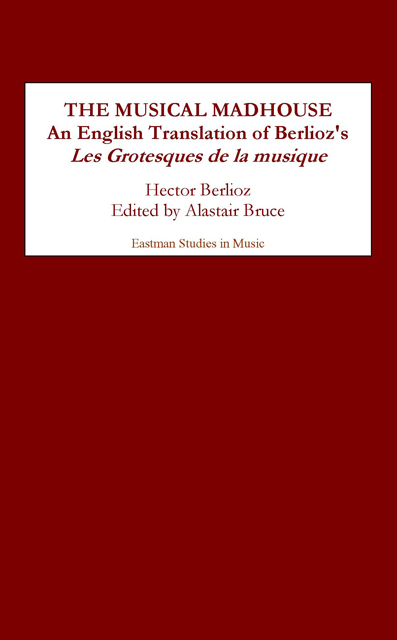Grotesque prejudices
Published online by Cambridge University Press: 21 March 2023
Summary
The utterances of prejudice are far grosser and stupider here in Paris than anywhere else—it would hold sway over every aspect of the art of music if it had its insolent way. Quite apart from what it has to say about harmony, melody and rhythm, one of its more outrageous assertions would have you believe there is only one possible form for texts intended for singing—that it is quite impossible to sing prose, and alexandrine verses are worst of all to set to music. Indeed some people maintain that all verse meant for singing should be, without exception, what is called “metrical” verse, that is to say verses with a uniform scansion all the way through, each one with the same number of long and short syllables in the same place.
As for setting prose to music, nothing could be easier; it’s just a matter of knowing what prose to set. The great masses and oratorios, the masterpieces of religious music, were written by Handel, Haydn, Bach and Mozart to prose texts in English, German and Latin. “Yes,” comes the answer, “it can be done in Latin or German or English, but not in French.” These days, if something isn’t done, people always say it can’t be done. It’s not even true that it isn’t done; there is music written to prose texts in French, and there’d be a whole lot more if you cared to look. Every day, in the bestknown operas, you can hear passages where the librettist’s verses have been changed around by the composer, chopped up, mangled and jumbled by repeating some words and even inserting others, so that the verse has in fact become prose, prose which matches and fits the composer’s intentions better than the recalcitrant verse.
Yet it can be sung without difficulty, and the piece is no less beautiful in musical terms; for melody makes a mockery of your pretensions to steer and sustain it through literary forms prescribed by anyone other than the composer.
A librettist once roundly criticised the verse text used for a new opera to me:
“What rhythms!” he said. “What a muddle! It might as well be prose. Here a long line, there a short line, no regularity in the placing of accents, long and short syllables scattered at random.
- Type
- Chapter
- Information
- The Musical MadhouseAn English Translation of Berlioz's <i>Les Grotesques de la musique</i>, pp. 135 - 140Publisher: Boydell & BrewerPrint publication year: 2003

